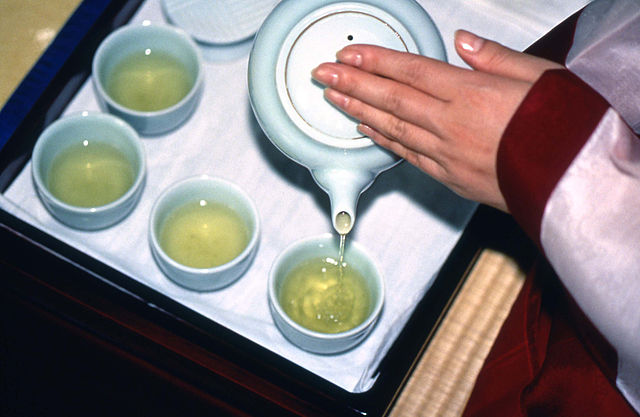Green tea has been recognized as a health boosting drink for more than four thousand years back to the legendary Emperor Shennong of China who is credited with teaching the ancient Chinese about agriculture and the use of herbal medicine. Green and black tea are made from the same plant (Camellia sinensis) and therefor both contain caffeine but the processing is what makes them different. Green tea leaves are simply dried. Black tea leaves go through an oxidation (rotting) process that causes the leaf to turn black. This process breaks down the natural bounds that trap ingredients such as caffeine so as to allow them to release more abundantly. So black will offer much more caffeine than green tea. See the reasons below why green tea makes a great health-supporting beverage.
Below is a list of green tea benefits – a summary based on Dr Weil’s article on green tea
- contains six times more antioxidants than black tea.1
- supports cardiovascular and metabolic health.2 – suggesting 5 or more cups per day less likely to develop high blood pressure, diabetes, or die of cardiovascular disease or stroke. Other animal study also showed green tea prevented thickening of the heart muscles.
- may reduce cholesterol levels.3
- can increase energy, mental focus and promote a state of calm awareness.4
- quickly calms and relaxes.5
- facilitates the burning of body fat.6
- may help prevent skin damage and cancer.7
- may improve bone health.8
- may lower the risk of certain types of cancer.9,10,11 Studies have examined green tea’s potential role in lowering risks of breast, ovarian, bladder, esophageal, and prostate cancers.
- improves insulin sensitivity and may help protect against diabetes.12
So make green tea a part of your daily self-care practice in prevention for greater health!
Processing Types of Camellia Sinensis

photo(s) source:
Processing Types / examine.com
“Green tea 1” by Korea.net / Korean Culture and Information Service (Photographer name). Licensed under CC BY-SA 2.0 via Wikimedia Commons.
Sources:
1 Serafini, M., A. Ghiselli, and A. Ferro-Luzzi. “In vivo antioxidant effect of green and black tea in man.” European journal of clinical nutrition 50, no. 1 (1996): 28-32.
2 Wolfram, Swen. “Effects of green tea and EGCG on cardiovascular and metabolic health.” Journal of the American College of Nutrition 26, no. 4 (2007): 373S-388S.
3 Kim, Hae-Suk, Vedrana Montana, Hyun-Ju Jang, Vladimir Parpura, and Jeong-A. Kim. “Epigallocatechin Gallate (EGCG) Stimulates Autophagy in Vascular Endothelial Cells A POTENTIAL ROLE FOR REDUCING LIPID ACCUMULATION.” Journal of Biological Chemistry 288, no. 31 (2013): 22693-22705.
4 Ruxton, C. H. S. “The impact of caffeine on mood, cognitive function, performance and hydration: a review of benefits and risks.” Nutrition Bulletin 33, no. 1 (2008): 15-25.
5 Juneja, Lekh Raj, Djong-Chi Chu, Tsutomu Okubo, Yukiko Nagato, and Hidehiko Yokogoshi. “L-theanine—a unique amino acid of green tea and its relaxation effect in humans.” Trends in Food Science & Technology 10, no. 6 (1999): 199-204.
6 Dulloo, Abdul G., Claudette Duret, Dorothée Rohrer, Lucien Girardier, Nouri Mensi, Marc Fathi, Philippe Chantre, and Jacques Vandermander. “Efficacy of a green tea extract rich in catechin polyphenols and caffeine in increasing 24-h energy expenditure and fat oxidation in humans.” The American journal of clinical nutrition 70, no. 6 (1999): 1040-1045.
7 Record, Ian R., and Ivor E. Dreosti. “Protection by black tea and green tea against UVB and UVA+ B induced skin cancer in hairless mice.” Mutation Research/Fundamental and Molecular Mechanisms of Mutagenesis 422, no. 1 (1998): 191-199.
8 Shen, Chwan-Li, James K. Yeh, Jay J. Cao, and Jia-Sheng Wang. “Green tea and bone metabolism.” Nutrition research 29, no. 7 (2009): 437-456.
9 Choan, E., Roanne Segal, Derek Jonker, Shawn Malone, Neil Reaume, Libni Eapen, and Victor Gallant. “A prospective clinical trial of green tea for hormone refractory prostate cancer: an evaluation of the complementary/alternative therapy approach.” In Urologic Oncology: Seminars and Original Investigations, vol. 23, no. 2, pp. 108-113. Elsevier, 2005.
10 Gao, Yu Tang, Joseph K. McLaughlin, William J. Blot, Bu Tian Ji, Qi Dai, and Joseph F. Fraumeni. “Reduced risk of esophageal cancer associated with green tea consumption.” Journal of the National Cancer Institute 86, no. 11 (1994): 855-858.
11 Imai, Kazue, Kenji Suga, and Kei Nakachi. “Cancer-preventive effects of drinking green tea among a Japanese population.” Preventive medicine 26, no. 6 (1997): 769-775.
12 Iso, Hiroyasu, Chigusa Date, Kenji Wakai, Mitsuru Fukui, and Akiko Tamakoshi. “The relationship between green tea and total caffeine intake and risk for self-reported type 2 diabetes among Japanese adults.” Annals of Internal Medicine 144, no. 8 (2006): 554-562.






